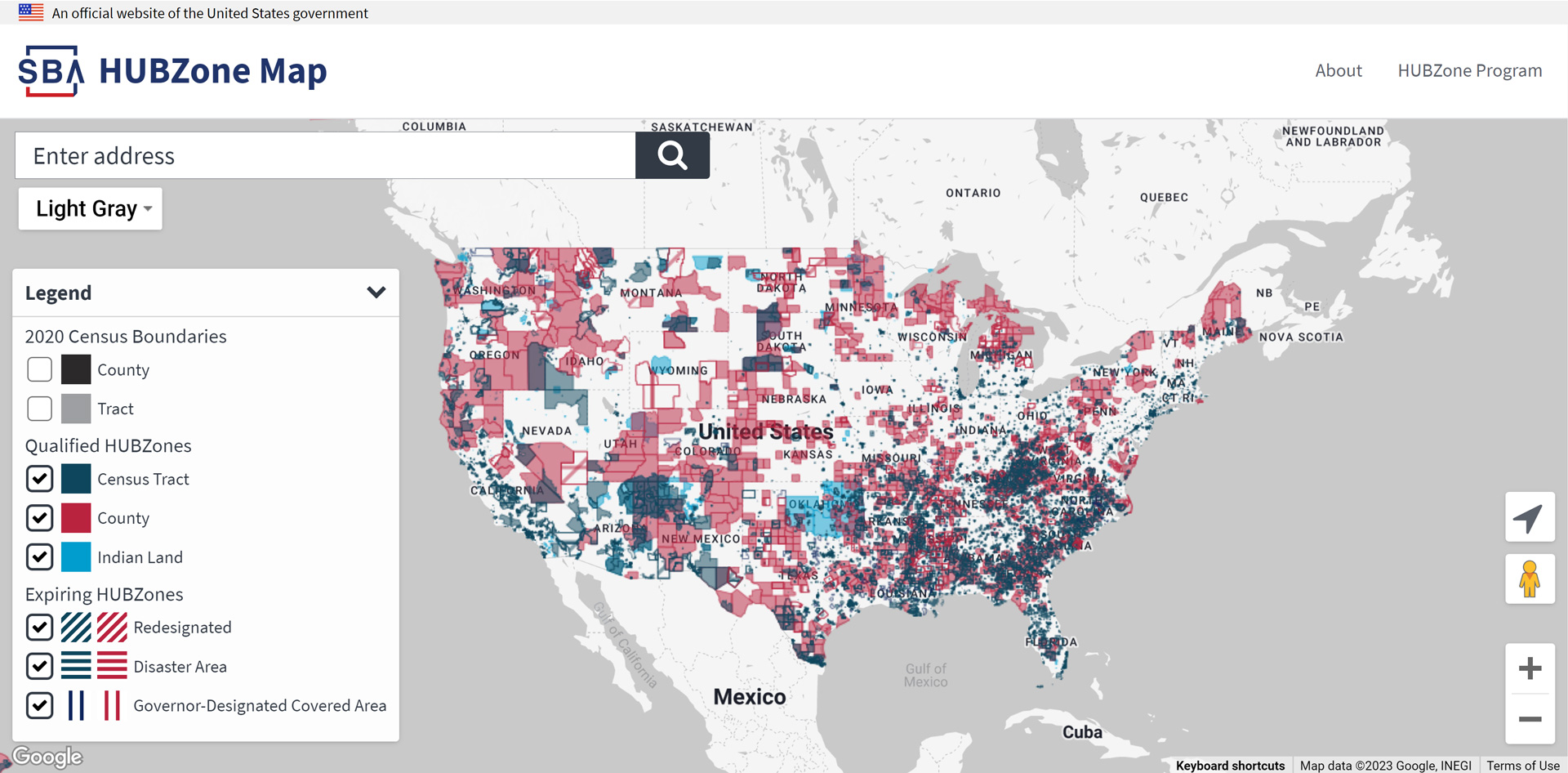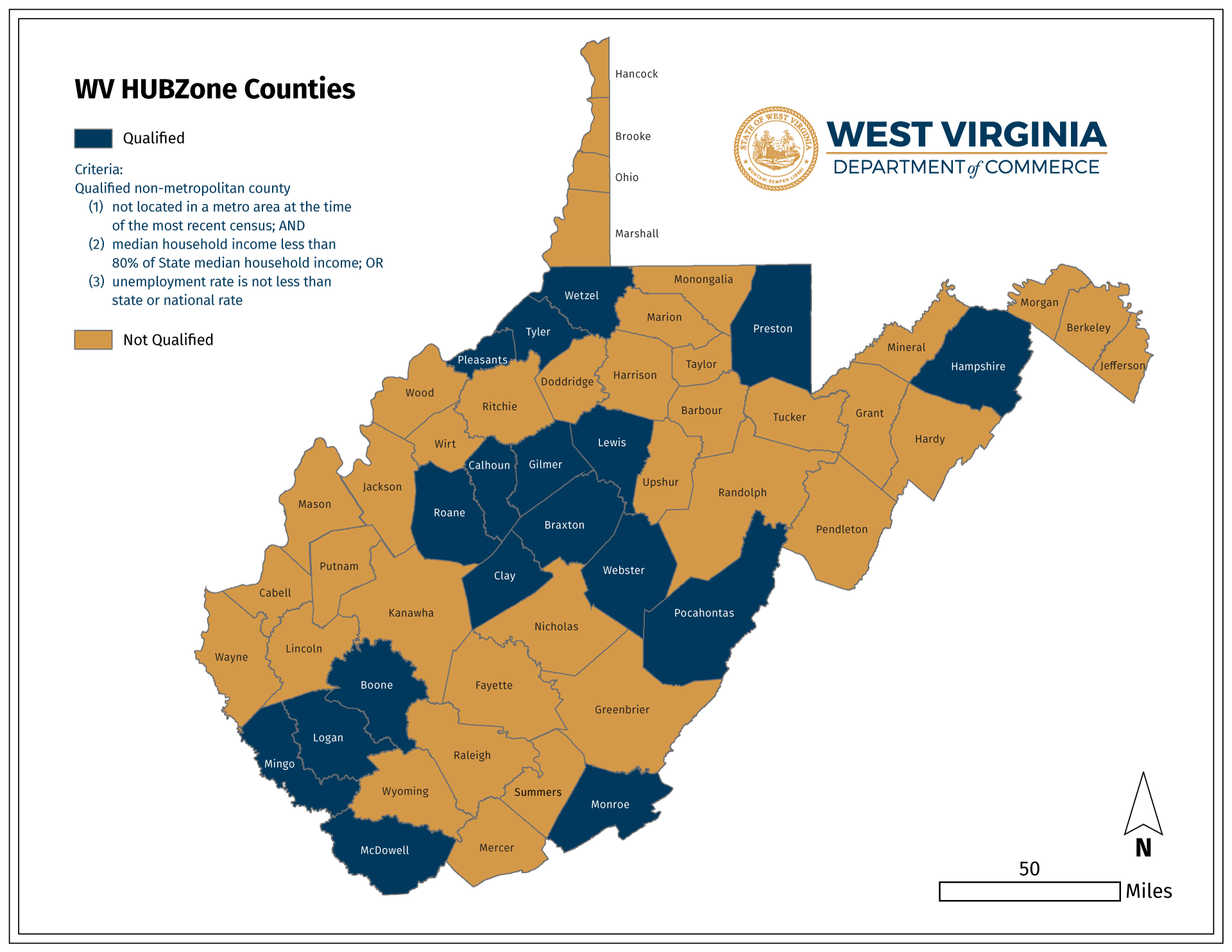West Virginia HUBZones
The HUBZone program gives participating small businesses a competitive advantage when bidding on federal contracts and can provide a lucrative alternative revenue stream.
Click image below to view interactive map
Small businesses taking advantage of the HUBZone program receive a 10% price evaluation preference when bidding on federal contracts, meaning the bid is considered at 90% of the total cost of the project when compared against 100% of the cost of other bids. This pricing preference helps to level the playing field between HUBZone businesses and other bidders. Eligible West Virginia small businesses should consider exploring new opportunities presented by the HUBZone program to serve not only as prime contractors but as subcontractors for companies that have established relationships with the federal government as well. Small businesses are in the driver’s seat, and the State is well positioned to assist those small businesses in navigating this newly expanded opportunity.
FAQs
1. What is a HUBZone?
A HUBZone is a geographic area that has been historically underutilized when it comes to small businesses and economic development.
There are six different types of HUBZones: (1) qualified census tracts; (2) qualified nonmetropolitan counties; (3) qualified Indian reservations/Indian Country; (4) military bases closed under the BRAC; (5) governor’s designated covered areas; and (6) qualified disaster areas.
2. What is a Governor-designated HUBZone?
A governor-designated HUBZone is an area selected by the governor of a state and approved by the United States Small Business Administration for HUBZone status. A governor-designated HUBZone has all the same benefits as any other HUBZone. One difference, however, is that governor-designated HUBzones only last for one year, while other HUBZones maintain status for five years. But, governors can petition the Small Business Administration each year for governor-designated HUBZones to maintain their status.
3. What businesses can participate in the HUBZone Program?
To qualify for the HUBZone program, your business must:
- Be a small business according to SBA size standards
- Be at least 51% owned and controlled by U.S. citizens, a Community Development Corporation, an agricultural cooperative, an Alaska Native corporation, a Native Hawaiian organization, or an Indian tribe
- Have its principal office located in a HUBZone*
- Have at least 35% of its employees living in a HUBZone*
You can find the full qualification criteria in Title 13 Part 126 Subpart B of the Code of Federal Regulations (CFR).
To see if your business is located in a HUBZone, check out the HUBZone Map. Note that the Map will change to account for recent census data on July 1, 2023.
4. What are the benefits of the HUBZone Program?
The HUBZone program benefits small businesses in three major ways. First, diversifies a businesses revenue streams through reliable federal contracts. Second, it serves as a foot in the door for federal contract work that can lead to additional opportunities. Third, it supports sustainable growth for small businesses.
There are many other benefits to the program as well, including but not limited to: business development through a mentorship program, access to a wide variety of contracts either as a subcontractor or a prime contractor, professional network of business leaders, perspective on market trends, and the opportunity to take your business to the next level.
5. How does the HUBZone program work?
“The HUBZone program fuels small business growth in historically underutilized business zones with a goal of awarding at least 3% of federal contract dollars to HUBZone-certified companies each year.” – Small Business Administration.
Certified small businesses participating in the program are able to bid for federal contracts set-aside exclusively for HUBZone-certified businesses. Additionally, when bidding on general contracts, HUBZone-certified businesses are evaluated with a 10% price preference compared to other bidders.
6. How does federal contracting work?
Small businesses can serve as prime contractors or subcontractors for federal contracts. As a prime contractor, the business would be responsible for ensuring the completion of the entire contract as it was bid out. As a subcontractor, the business would be responsible for part of the larger contract.
For example, if the federal government wants to build a facility somewhere, a prime contractor will win the bid and may engage with any number of subcontractors to ensure the work is completed. One subcontractor may provide the architectural work, another the construction labor, and another the interior design component.
This simplified example is just the beginning of what federal contracting can mean for your business. Once familiar with the process, working with the federal government is a great way to bring your business sustainable growth and success.
7. Can my business benefit from the HUBZone program?
Yes! Assuming your business is HUBZone certified (see question 3), most businesses can find value in the HUBZone program. The opportunity to serve as a subcontractor allows businesses to seek out the contracting opportunities that are compatible with their product or services. There are many free and subscription based tools available that assist HUBZone certified businesses locate the contracts that are the best fit for them.
HUBZone business are also part of a network of dedicated professionals across any number of disciplines. From engineers, to construction, to IT, the federal government’s contracting needs are endless. Your business can help fill that need.
8. How do I get started?
If you are interested in learning more about the HUBZone program or how your business can participate, follow these three steps:
- Download the HUBZone Toolkit
- Think about the products or services your business can provide
- Insert your email address
When you provide your email address, you will be added to the Department of Commerce’s HUBzone mailing list. Additionally, you will receive the contact information for state and local officials, West Virginia’s Small Business Administration office, and business leaders all focused on assisting businesses through this new process.
We recognize that this process can seem daunting at first. But reach out and use the resources available to further look into this program before deciding it is not for you.


